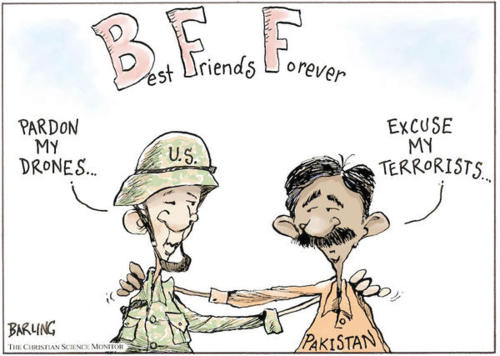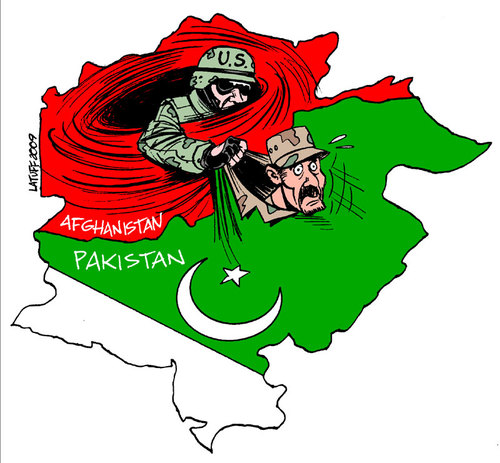
Pakistan and Afghanistan:
Connecting the Problems and the Solutions

INTL 407/507 (CRN 42406/42407) Professor Anita M. Weiss
Summer 2012, June 26-July 26, T, Th 4 - 8:50 pm Office: 307 PLC; 346-3245
116 Education Hours: by appointment
This seminar introduces participants to contemporary sociopolitical issues in Pakistan and Afghanistan, with a focus on how the fates of these two countries have become intertwined in the past three decades. Our starting point is 1979: the year Zia ul-Haq implemented his Islamization program (in February) and the Soviet Union invaded Afghanistan (in December). The reverberations from these two events continue to affect the fates of both countries today.
We begin with an overview of Pakistan’s political history since the 1970s, emphasizing those issues that contributed to cultural and political breaks from the past. These include, notably, the implications from Zia’s Islamization program and the influence of Saudi Arabia and Wahhabi Dawah movements. We then turn to Afghanistan and the resultant mobilization of Muslims from around the world by the U.S. to fight the Soviet Union in Afghanistan including the founding of an organization to help them settle in to wage this jihad, The Base, now known as al-Qaeda.
We then turn to look at how these events irretrievably transformed both Pakistan and Afghanistan, exploring the 'culture wars' which plague Pakistan today, and address the subsequent rise of the Taliban movement in Afghanistan. As part of this discussion, we look at how political changes within Pakistan and Afghanistan in the 1990s affected perceptions of external threats, the continued rise in influence of Islamist discourse, and how the Kashmir conflict further aggravated regional geopolitics.
Following this, we tfocus on the U.S. invasion of Afghanistan in October 2001 and the subsequent victory of the Muttahida Majlis-e-Amal (MMA), a coalition of six Islamist political parties, in the NWFP provincial elections in October 2002. We will look at the rise of the Pakistan Taliban movement in part as a response to continued U.S. military involvement in the region, and events of spring 2009 with the TNSM takeover of Swat and the subsequent military response.
We conclude by considering potential paths for the future of this region.
Class format
Professor Weiss will open each class with a short lecture on the issues which are raised in the various assigned readings. When possible, these lectures will be augmented by film clips and discussion questions and then extensive in-class discussion.. Each day will include a 15-minute break sometime between 6 - 6:30 pm.
There will be assigned readings for each day which can be found in the following required texts (available at the UO bookstore). Please try to complete all readings before the day in which they will be discussed.
Stephen P. Cohen and others The Future of Pakistan Brookings Institution Press, 2011
Seth G. Jones In the Graveyard of Empires: America's War in Afghanistan W.W. Norton, 2009
Riaz Mohammad Khan Afghanistan and Pakistan: Conflict, Extremism, and Resistance to Modernity Johns Hopkins University Press, 2011
Syed Saleem Shahzad Inside al-Qaeda and the Taliban: Beyond Bin Laden and 9/11 Palgrave Macmillan, 2011
Requirements
Participation/attendance (15%) Full attendance and active participation are not simply a requirement, but a given for this class. Our collaborative effort will succeed only if each of you is fully engaged, has completed all of the assigned reading material before each class meeting, and offers your questions, ideas, inspirations, and critical reflections energetically.
Reflection Briefs (30%) The readings may appear heavy but remember, each week is the equivalent of 2/12 weeks of a regular term. Each week you will prepare a brief written response (2-3 pages) to some of the week’s readings; the reflection brief for the first week is due on Thursday June 28, and the next two reflection briefs are due July 3 and July 10. In these essays you will offer your reactions to the topics, issues, and/or perspectives presented in one or two of that week’s selections. The essays should not be ‘book reports’ – simple summaries of the readings - but instead should identify and explore content that strikes you as worthy of discussion in class. Since these assignments are really designed as a way to help you process your weekly readings, grading of these briefs will consist of a simple check system – check plus, check, check minus based on your level of engagement with the materials. The average total of these checks will inform your grade for this section.
Research Paper (6 pages) and in-class presentation (35%) Identify one critical problem that exists today in either Pakistan or Afghanistan; explain why you consider this remains a critical problem in the country; and brainstorm on (realistic) ways you think this one, single problem could be resolved, and the implications that resolving this problem would have on the region. While there will likely be duplication in identifying problems, I look forward to hearing creative, innovative -- yet realistic -- solutions offered. All written research papers are due Tuesday July 17. We will create a presentation schedule on Thursday July 12; in-class presentations will be Tuesday and Thursday, July 17 and 19.
Take-home final exam (35%) This will be based in part on readings and lectures, but also on what students learn from each other in their in-class presentations.
Suggested f or further reading:
Thomas Barfield Afghanistan: A Cultural and Political History Princeton University Press, 2012
Stephen P. Cohen The Idea of Pakistan Brookings Institution Press, 2004
Steve Coll Ghost Wars: The Secret History of the CIA, Afghanistan, and Bin Laden, from the Soviet Invasion to September 10, 2001 Penguin 2004
Imtiaz Gul The Most Dangerous Place: Pakistan's Lawless Frontier Viking 2010
Husain Haqqani Pakistan: Between Mosque and Military Carnegie Endowment for International Peace, 2005
Shuja Nawaz Crossed Swords: Pakistan, its Army, and the Wars Within Oxford University Press, 2008
Ahmed Rashid Descent into Chaos: the United States and the Failure of Nation Building in Pakistan, Afghanistan and Central Asia Viking 2008
Ahmed Rashid Taliban: Militant Islam, Oil and Fundamentalism in Central Asia Yale
University Press, 2000
Ian Talbot Pakistan: A Modern History St. Martin's Press, 1998.
Weiss, Anita M. "A Provincial Islamist Victory in Pakistan: the Social Reform Agenda of the Muttahida Majlis-I-Amal" in John L. Esposito, John O. Voll and Oman Baker (eds.) Asian Islam in the 21st Century Oxford University Press, 2008, pp. 145-173.
Syllabus
Week 1, June 26 & 28 Foundations and Setting the Stage
Film: View from a Grain of Sand: Three Women, Three Wars, Stories of Survival from Afghanistan (Law Video)
Required Reading
Cohen, pp. vii-ix, 1-62
Jones, pp. xi-xiv, xix-xxxiv, 3-22, 23-40
Khan, pp.1-12, 209-211, 258-319
Shahzad, pp. ix-xi, xiii-xx, 124-155
Shahzad Bashir & Robert D. Crews (eds.) Under the Drones: Modern Lives in the Afghanistan-Pakistan Borderlands (Harvard UP, 2012): “Introduction”, pp. 1-8; Amin Tarzi “Political Struggles over the Afghanistan-Pakistan Borderlands” pp. 17-29; Sana Haroon “Religious Revivalism across the Durand Line” pp. 45-59
Jinnah's address to the Constituent Assembly of Pakistan August 1947
Week 2, July 3 & 5 The Democratic Interregnum in Pakistan, the Taliban
in Afghanistan and al Qaeda (late 1980s - 2001)
Film: Khuda kay Liye (In the Name of God)
Required Reading
Cohen, pp. 82-89, 182-197
Jones, pp. 41-51, 52-68, 69-85
Khan, pp. 15-98
Shahzad, pp. 1-10, 72-80
Week 3, July 10 & 12 After September 11th, the U.S. attack on Afghanistan,
and the rise of militancy within Pakistan
Slideshow on Swat (PATA)
Required Reading
Cohen, pp. 134-147, 236-247, 257-282
Jones, pp. xiv-xviii, 86-108, 109-133, 134-150, 158-162, 213, 256-277
Khan, pp. 99 - 161, 211-257
Shahzad, pp. 11-71, 80-123, 156-176, 177-198, 199-215
Shahzad Bashir & Robert D. Crews (eds.) Under the Drones: Modern Lives in the Afghanistan-Pakistan Borderlands (Harvard UP, 2012): Faisal Devji “Red Mosque” pp. 153-161
Week 4, July 17 & 19 Challenges Today: Student Presentations and Wrap-up
Schedule for student presentations
Required Reading
Cohen, pp. 70-80, 150-157, 199-212, 284-293
Jones, pp. 163-182, 183-202, 281-295, 313-325
Khan, pp. 162-205, 323-364
Shahzad, pp. 216-226
Daniel Markey “Securing Pakistan’s Tribal Belt” Council on Foreign Relations, Special Report No. 36, August 2008
Ashley Tellis "Pakistan's Impending Defeat in Afghanistan" Carnegie Endowment for International Peace, Commentary, June 22, 2012
"NATO not permitted to transport lethal weapons: FO" Dawn 5 July 2012
"Mullah Radio Re-emerges as a Threat"

